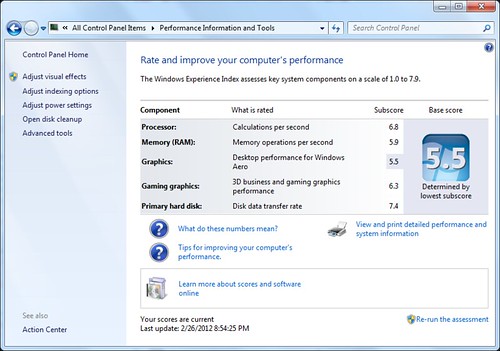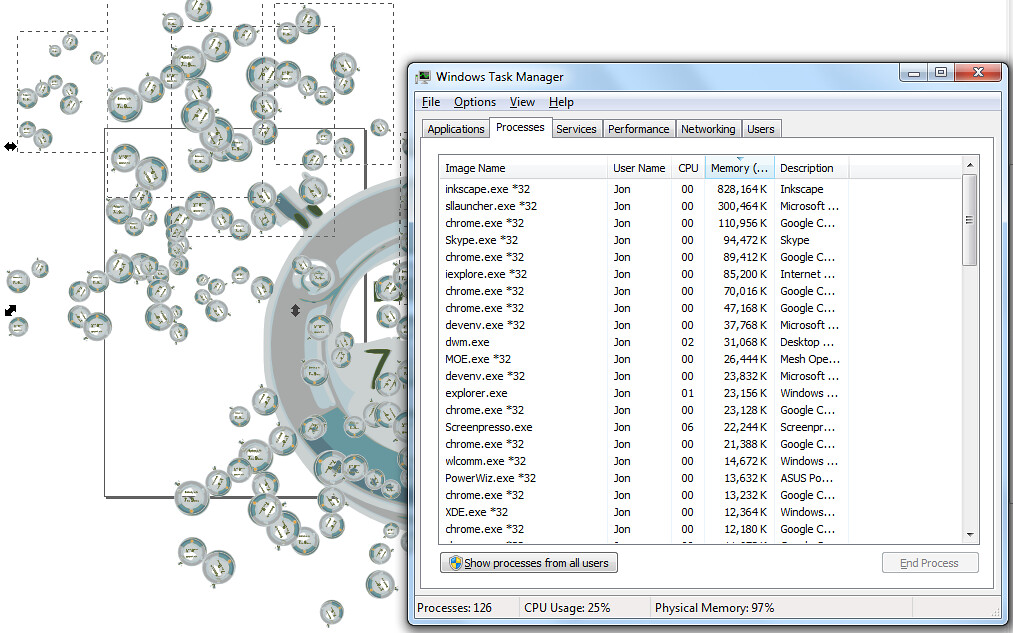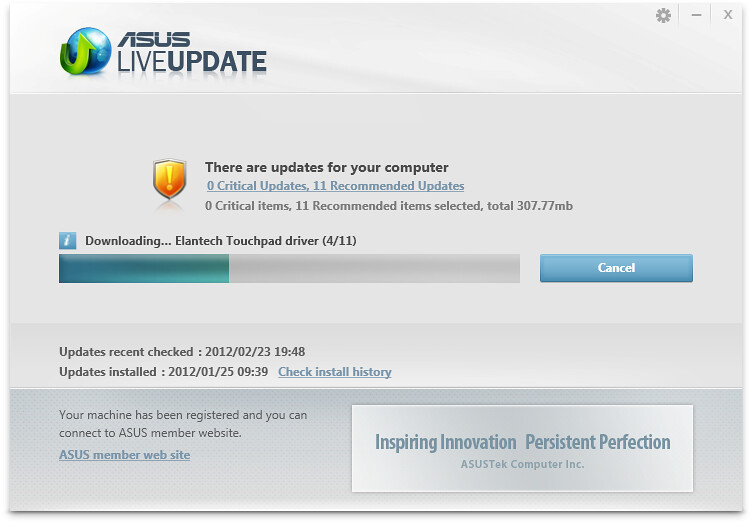ZenBook UX31E - Follow up
I previously wrote about some initial impressions of a ZenBook UX31E I've been reviewing. I've been using it heavily since then and wanted to follow up on how it's been working for me.
As A Work / Development Machine
When I'm working during the day, I usually have both a multi-monitor desktop computer and one or more laptops running. I usually have 1-2 Office documents open, 2-3 copies of Visual Studio 2010, Audacity, and several dozen tabs open in Chrome. I bounce back and forth between my desktop and laptop throughout the day.
Evenings / nights / weekends I'm often doing some sort of hacking for fun, with podcast editing in the background - 2-3 copies of Visual Studio, Audacity, dozens of browser tabs. So, pretty heavy use most of the day.
This thing holds up. It's not just a cute, convenient machine, it's good enough that it's been my primary dev and work machine since I got it over a month ago. I've kept it on my desk, right next to my super-beefy Lenovo W520, so that if it every slowed me down I'd just hop over to the Lenovo. That hasn't happened, which surprises me as much as it may surprise you.This thing is really snappy as a dev machine. I've been doing web development (including ASP.NET 4 Beta) as well as Windows Phone and WPF work. It really holds up.
People have commented on my previous post that this machine's got to be underpowered because it's only got 4GB RAM, non-upgradable. I haven't found that to be an issue. The stats and overall performance on this machine are pretty decent overall:
Numbers and specs are fine, but what's really important for me is how it handles in everyday use. As I've said, I've been using this laptop a lot over the past month, and I've found it to be more than up to the task. Just to see if I've been subconsciously taking it easy on this thing, I just loaded up:
- Two projects in Visual Studio 2010 (one WPF, one ASP.NET MVC 4 Beta)
- Windows Phone Emulator
- Twenty odd tabs in Chrome
- A few tabs in IE9
- Seesmic Desktop 2 (Silverlight) with lots of plugins and columns
- Windows Live Writer
- Skype
- PowerShell console window
- VLC (playing a 1 hour MP3)
- Audacity (editing a 1 hour audio file)
- PowerPoint 2010 (40 slide deck with a pretty good amount of images)
- Windows Live Writer
- Notepad++ (a few tabs open)
I've also got some standard background stuff running - Microsoft Security Essentials, Mesh, pretty much all the Asus stuff that came pre-installed.
And all of those apps are running smoothly. No lags, quick compiles, etc. It's responsive.
So now I was curious as to what would cause things to drag noticeably. I decided to leave all the above running and load up Inkscape, then create tiled clones until it was taking nearly 1GB memory and saturating one core (each clock image below has a lot of vector data). That finally slowed things down a bit.
The point is that, for just about any realistic day to day use, this thing work great. I really had to go out of my way to get things to slow down. If you really need workstation performance, you're probably not shopping for an ultrabook. I said in my previous introductory review that this UX31 was challenging my preconceptions about the performance I could expect out of a small form factor laptop, and that's continued to hold true over the past month. I'm convinced.
As a Technical Presentation Machine
This past month at TechReady, I presented a 75 minute talk on Mobile Development with ASP.NET MVC 4 to 120 people. It was a standard conference presentation: big stage, slides and demonstrations projected on a big screen, butterflies in stomach. I had mobile emulators running, PowerPoint going, and wrote a lot of demo code on the fly.
This, for me, is the biggest stress test for a laptop. I'm usually pretty easy going, but when I'm speaking I get really sensitive to the slightest delays or difficulties from my laptop. I get mad. If this laptop was going to disappoint me, this would have been the time.
I did all my preparation on the Zenbook, but had all the code set up on my humongous Lenovo W520 and was ready to bail out at any time. I wanted to present on this laptop, but I wasn't going to go with it if I thought I'd likely hit problems. No problems during my preparation. I took both laptops to the talk, just in case.
Everything went fine - all my demos were fast.
No problems with user input, either. When I'm presenting, I'm rushed and nervous and usually struggle with typos and trackpad foibles a lot more than in normal daily use. Not only didn't I have problems, I the keyboard worked better for me than on other laptops I've used in the past.
Everything went fine when I hooked it up to the projector. That wasn't by accident - the great video support was one of the reasons I'd requested the Zenbook UX31, as it supports resolution up to 1600x900 (best resolution of any Ultrabook, including the MacBook Air). There are two dongles included for both ethernet and standard SVGA, and they worked just fine.

As A Casual "Couch" Machine
I spend a lot of my off hours on a laptop. I'll be sitting on the couch with my wife and kids, pretending to watch movies or TV shows, but really just surfing or coding or whatever. That used to get me in trouble because I was very clearly not spending quality time with the family - as if watching TV together was quality time. But I digress.
Things lightened up as the rest of the family got tablets and Kindle Fires and other smart devices. But still, for some reason, having a giant laptop wasn't considered as socially acceptable as browsing Facebook on a discreet little tablet. Fortunately, this tiny little laptop seems to be a lot more socially acceptable. It fits in better with cute little devices. When I'm using it, people assume I'm doing light, happy, frivolous things (even if it's not the case).
I know this seems like a fluffy, non-technical thing to write in a laptop review, but it really is nice. I don't feel any social awkwardness using this on the couch or whatever. It looks like a casual device, even though I don't use it that way at all.
Travel / Mobile
This is pretty obvious, but of course this thing travels very well. It's small and lightweight, so it's easy to carry around. It's easy to take out on an airplane and just put in the seat pocket in front of me when I'm not using it. The battery easily lasts 4-6 hours, much longer in sleep mode. The charger and video/ethernet dongles are really small and travel well, too. Oh, and it feels solid enough that I don't worry about is as much as I would with a conventional laptop.
Other good features
Speakers
The sound on this thing is great. It's better than any other laptop I've used. I use this laptop as a boombox while I'm jogging on the treadmill. The sound isn't just loud, it's substantial, and it's rich. I've shown it off with electronic music and classical music, and everyone I've shown has really been impressed.
Quick power up
This boots up very quickly, and resume from sleep is so fast (under two seconds) that it's essentially instant. This feels like a device, not a traditional laptop. I use it more because there's no wait to powering it on.
Keyboard
The keyboard seems to be a like it or hate it kind of thing. It works great for me. I've read that some people have trouble with key presses not registering, but I type pretty hard and don't have that happen at all.
Criticisms
I've only got a few minor criticisms, and all of them are pretty minor.
Bundleware and utilities
I mentioned this in my last review too, so I won't go into gory detail. Fresh out of the box, the Zenbook's got some simple bundleware like the Bing bar as well as a host of ASUS utilities. Some of the utilities, like the power management utilities, are worthwhile. Others like the ASUS LifeFrame application seem unlikely to be useful to most users.
I don't get too upset by these for two reasons:
- They're easy to uninstall with PC Decrapifier
- It's a one time hit - once the laptop's set up, it's set up
Never the less, I wish they just shipped a default Windows install and chilled out with the gadgets and utilities. I'd prefer a desktop shortcut that links to the ASUS Zenbook utility download page.
ASUS Live Update
I don't want to deal with a separate utility for driver updates. I've already got Windows Update running, and I'd like these updates to come to me that way.
What's worse, the Live Update app doesn't give feedback during some of the installs, and seemed to hang at times. I restarted it a few times because I wasn't sure if it was working.
Before I installed the recommended ASUS Live Update drivers, I had two spontaneous reboots (weeks apart). After installing the drivers, I haven't seen that happen, so I'm hoping that the drivers solved things.
Power connection
I generally like the power cord. It's pretty small, and I like the light on the charging connection which makes it both easy to find the connector in the dark and to tell if it's charging or charged.
The criticism is that it's a small right angle connector, and it's a little fragile. The laptop got bumped while the charger was plugged in, and it bent slightly. Everything still works, but it feels a little loose. All the other hardware is really solidly constructed, but this connection feels flimsy.
Keyboard lighting
This is more of a wish than a criticism, but I wish the keyboard were easier to use in the dark. It's pretty much the only MacBook Air feature I envy. My Lenovo has a ThinkLight feature, which is just an LED light above the display that shines down on keyboard when (toggled via key combination). I'd be happy if a few of the keys had lights on them. As it is, typing in a dark room is kind of tricky.
Trackpad: works on my machine
I've heard from people who have had problems with the trackpad. Apparently there are two different trackpads that ship with this laptop, and one doesn't work as well as the other. I got the Elantech Touchpad, and it's worked great for me.
Wrap up
Overall, I'm greatly impressed with this laptop. It gives me the benefits of a device with the power of a development / work machine. If I were buying another laptop today, or recommending one to a friend, it would be this one.
I'll be posting one last wrap up post in another month or two.
Disclosure of Material Connection: I received one or more of the products or services mentioned above for free in the hope that I would mention it on my blog. Regardless, I only recommend products or services I use personally and believe my readers will enjoy. I am disclosing this in accordance with the Federal Trade Commission’s 16 CFR, Part 255: “Guides Concerning the Use of Endorsements and Testimonials in Advertising”


